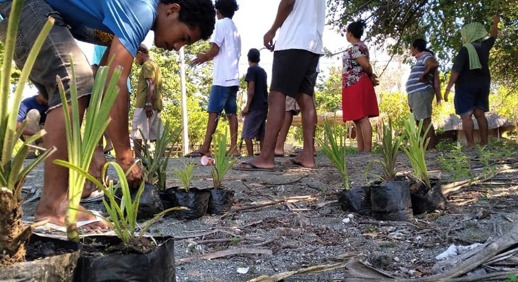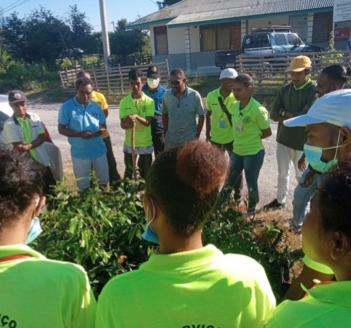Coastal environments and their biodiversity have, for centuries, played significant roles in the livelihoods of the communities dwelling along the coast. However, they are now under mounting pressure from rapid population growth and climate change, with potentially dire consequences for the global community. With Timor-Leste being one of the Small Island Developing States (SIDS), such an impact is keenly felt and cannot be taken lightly. the Ministry of Agriculture and Fisheries (MAF) and the United Nations Development Programme (UNDP) are responding to these man-made problems with nature-based solutions, such as replanting and watersheds conservation.
Read also: Casting the Net Wider: Expanding Regional Protection for the ATS Region

As with many of SIDS states, Timor-Leste is influenced by the long droughts of El Niño and La Niña’s intensified rainfalls, which frequently cause stormwater runoff from upland to coastal areas, posing a significant threat to economic and environmental sustainability. Sedimentation from soil erosion has become a major source of marine pollution, particularly on the south coast, impacting fisheries, ecosystems and livelihoods. An MAF and UNDP survey estimates that between four and nine tonnes of sediment per hectare are entering the sea every year. Sedimentation in upper watersheds from deforestation and land clearing for agriculture can smother coral reef habitats and dramatically reduce fish biodiversity.
To prevent upland soil degradation from jeopardising coastal habitats, trees are needed within the catchment area to provide soil cover and retain water. From 23-24 April 2021, UNDP Timor-Leste, along with over 100 volunteers, conducted tree planting and ecosystem restoration in Manufahi Municipality. The tree planting was conducted in collaboration with fishermen representatives, local communities from Aldeia (sub-village) Beé Metan, Aldeia Selihasan and Aldeia Loti, in order to conserve 30 natural spring water sources and protect lake habitats inland to ensure sustainable fish production. Students from a local senior high school and Instituto Politécnico Betano University also joined the tree planting exercise.
“Everyone in the country must care about the environment and protect their land to avoid erosion and reduce [the risk of] disaster,” said Municipality Administrator Mr. Arantes Izaac Sarmento, during the launch of the tree planting and ecosystem restoration programme in the coastal areas and uplands of Manufahi Municipality.

As documented in the ATS transboundary diagnostic analysis (TDA) completed in 2012, coastal and marine ecosystems and communities in the Arafura and Timor Seas (ATS) are especially vulnerable to climate change. Therefore, to conserve these ecosystems and support communities amid the increasing impacts of climate change, the GEF/UNDP/PEMSEA ATSEA-2 Programme integrates nature-based mitigation activities and community-level knowledge sharing into coastal management.
(Almerindo Oliveira Da Silva)


